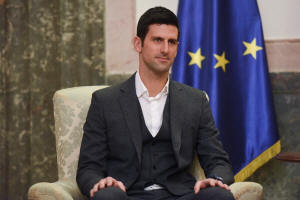|
After an 11-day rollercoaster involving two visa cancellations,
two court challenges and five nights in two stints at an
immigration detention hotel, the unvaccinated Djokovic was
deported before the tournament began.
The debacle deprived the 34-year-old the chance to win a
record-extending 10th Australian Open and a men's record 21st
Grand Slam title.
Instead career-rival Rafa Nadal won the title and moved to 21
and with Djokovic unwilling to have a vaccine limiting where he
might be able to play, the Serb is jeopardising his dream of
ending his career with the most Grand Slam titles.
"I understand the consequences of my decision," Djokovic told
the BBC, adding that he had been prepared not to travel to
Australia due to his unvaccinated status.
"I understand that not being vaccinated today, I am unable to
travel to most of the tournaments at the moment. Yes, that is
the price that I'm willing to pay.
"Because the principles of decision making on my body are more
important than any title or anything else."
Encouragingly for Djokovic's hopes of trying to defend his
French Open and Wimbledon titles, travel rules in France and
Britain have been eased for unvaccinated travellers and they no
longer need to undergo quarantine.
His prospects of playing in the United States, including the
U.S. Open, look bleak at the moment, however, as vaccination
certificates remain compulsory.
Defending his right to shun vaccines, Djokovic, who follows a
strict diet, said: "I just don't have enough clarity of how the
COVID vaccine will affect me and whether it's going to create a
certain effect on my game and I wouldn't have the benefits that
I would normally have."
However, he said he respected the global vaccine programme and
did not entirely rule out having a jab in the future.
"I understand that globally, everyone is trying to put a big
effort into handling this virus and seeing, hopefully, an end
soon to this virus," he said.
"As of today this is kind of my decision and my stance and I
know I will suffer the consequences. I keep my mind open and you
know, we'll see what happens."
MELBOURNE SAGA
Djokovic fuelled widespread anger in Australia when he was given
a medical exemption from mandatory COVID-19 vaccination to
compete at Melbourne Park on grounds that he had recently
contracted the virus.
But he was detained by immigration authorities on arrival,
released by a court order and then detained again before
eventually being deported.
The case stoked global debate and Australian Immigration
Minister Alex Hawke said Djokovic could be a threat to public
order in the country because his presence would encourage
anti-vaccination sentiment.
"I have never said I am part of that movement. No-one in the
whole process, during Australian saga has asked me for my stance
or opinion on vaccination. No-one," Djokovic, who insists he had
followed all the rules in travelling to Australia, said.
"I was really sad and disappointed with the way it all ended for
me in Australia.
"The reason why I was deported from Australia was because the
Minister for Immigration used his discretion to cancel my visa
based on his perception that I might create some anti-vax
sentiment in the country or in the city, which I completely
disagree with."
He did apologise for meeting a French journalist for an
interview before leaving for Australia, having already had a
positive COVID-19 test result, saying suggestions he did not
take the virus seriously were wrong.
"Should I have advised them? Absolutely. It was my mistake and I
own it."
Djokovic, who is set to return to action in Dubai next week, was
also asked about his time in the detention hostel.
"Definitely it wasn't pleasant, but I don't want to be sitting
here and complaining because I stayed around seven days and some
people there have stayed for years. It has deeply touched me.
"My hardship was nothing close to what these people are going
through."
Djokovic also said he had found it hard to watch the final.
"I didn't want to watch the match because I wanted to be on the
court," the Serb said. "I was very neutral, I didn't cheer for
anyone as I wanted to be there so badly."
(Reporting by Sudipto Ganguly in Mumbai; additional reporting by
Martyn Herman Editing by Clarence Fernandez, Himani Sarkar, Ed
Osmond, Christian Radnedge and Toby Davis)
[© 2022 Thomson Reuters. All rights
reserved.]
This material may not be published,
broadcast, rewritten or redistributed.
Thompson Reuters is solely responsible for this content. |
|






